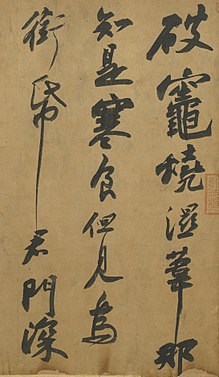Sushi

Su Shi ( Chinese 蘇 軾 / 苏 轼 , Pinyin Sū Shì , * January 8, 1037 , † August 24, 1101 ) was a poet, painter, calligrapher and politician of the Chinese Song Dynasty . He is better known under his pseudonym or honorary name Su Dongpo ( 蘇東坡 / 苏东坡 , Sū Dōngpō - "Su from the eastern slope"), which he gave himself when he lived on an estate in Dongpo ("eastern slope") while he was exiled to Hubei . A variant of the name is Dongpo Jushi ( 東坡 居士 / 东坡 居士 , Dōngpō Jūshì - "Hermit from the eastern slope").
Life
Su Shi was born in Meishan , in today's Sichuan Province, as the son of the literary man Su Xun ( 蘇 洵 / 苏 洵 , Sū Xún ). His brother Su Zhe ( 蘇轍 / 苏辙 , Sū Zhé ) later also became a famous scholar.
In 1057, Su Shi and his brother passed the Jinshi Civil Service Exam , a requirement for high government office. He entered the civil service in 1060 and held various civil servant posts across China for twenty years .
The most famous activity was in Hangzhou , Zhejiang Province. The Su-Dam, which runs across the West Lake and still exists today, is a reminder of this time.
In 1069, Su Shi became secretary in the Ministry of Civil Servants and a declared opponent of Wang Anshi's reform policies , which led to his sentencing to Huangzhou, Hubei Province. He lived there in a small country estate with no income in deep poverty. Very often he crossed a lake that has now dried up to the "Red Slope" Dōngpō, after which he was nicknamed. During this time he had contact with a Zen priest and studied meditation and Buddhism. In 1079, Su Shi was brought to trial for making abusive statements about the government and was even jailed for a short time. It was not until 1086, when Wang Anshi died, that he was recalled to the imperial court in Kaifeng and held high state offices again.
In 1094, when the Reform Party came back to power, Su Shi was tried again for allegedly condemning the emperor. This time he was exiled to what is now Guangdong Province and then to the subtropical island of Hainan , which at that time was still outside the Chinese cultural sphere of influence. In 1101 the empress mother had Su Shi rehabilitated, but he died after his pardon in the same year in the town of Changzhou, in what is now Jiangsu Province .
Even after his death, Su Shi was alternately ostracized and respected. His works were banned for decades and his name was engraved on a stele as the name of one of the 120 traitors . Later, Su Shi was even honored with a place in the Confucius Temple, from which the tablet with his name was removed six centuries later.
Historical background
The cause of Sus's restless and changeable biography can be seen in the turmoil of the late 11th century. Political parties were formed at that time, comparable to the groupings within today's one-party systems , which fought against each other to achieve their respective goals. A change of power almost always resulted in political purges. This was also the reason why Su Shi, who had repeatedly criticized the government's policy, was transferred to punishment, banned and imprisoned. These penalties were extremely moderate compared to those of previous dynasties.
The main reason for the decades-long party dispute were the reforms of Chancellor Wang Anshi. Su Shi later personally apologized to Wang Anshi for these attacks:
“When the new policy was first announced, we must have been too biased. In our enthusiasm for counter-arguments, we hurt the country a lot. We spoke impulsively and seldom met the truth. "
No resentment remained from the former opposition. When Wang Anshi retired from active politics, the two poets even met to discuss literature.
The pork dish "Dongporou" is named after Su Dongpo ( 東坡肉 / 东坡肉 , Dōngpōròu - "meat of the Dongpo style"). The poet is said to have invented it when working on a poem made him forget a pot of pork stewing on the stove. After several hours it has acquired a delicate tenderness. Dongporou is now made from fat pork belly, which is cooked for hours with soy sauce, rice wine, sugar and spices and then usually steamed until the fat and the rind take on a creamy consistency.
Works

Su Dongpo stood out primarily for his poetry and prose. He wrote about 2,700 poems. His most famous poems are:
- Chibifu ( 赤壁賦 / 赤壁赋 , Chìbìfù - "The red cliffs")
- Shuidiao getou ( 水調歌頭 / 水调歌头 , Shuǐdiào gētóu - "Memory of Su Che at the Moon Festival ")
In addition, Su Dongpo was an important representative of the Chinese ink painting created during the Song Dynasty .
In Chinese calligraphy he was counted among the " four masters of the Song era " ( 宋 四 家 , Sòng sì jiā ), to which Huang Tingjian also belonged.
literature
- Charles Hartman: "The inquisition against Su Shih: his sentence as an example of Sung legal practice", in: Journal of the American Oriental Society , Vol. 113 (1993), no. 2, pp. 228-43
- Lin Yutang: The Gay Genius; New York, Day Company, 1947
Web links
- Literature by and about Su Shi in the catalog of the German National Library
| personal data | |
|---|---|
| SURNAME | Sushi |
| BRIEF DESCRIPTION | Chinese poet, painter, calligrapher, and song dynasty politician |
| DATE OF BIRTH | January 8, 1037 |
| DATE OF DEATH | August 24, 1101 |
